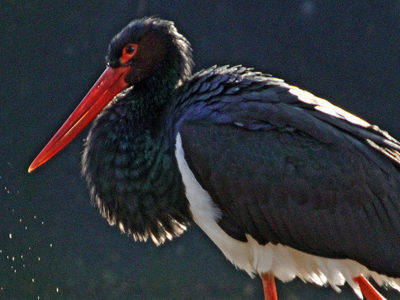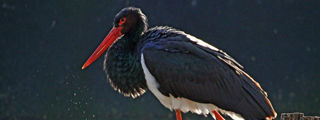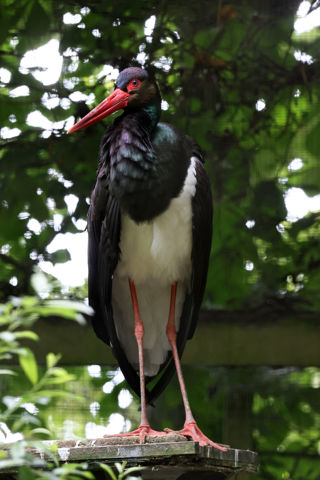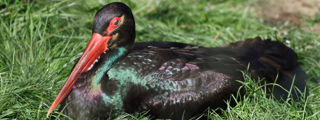
Black Stork
Ciconia nigra
The Black Stork is a large bird, standing as tall at 102cm, with a 145-155cm wingspan, and they weigh on average around 3kg. They have long necks, with long pointed red bills and red legs. Their plumage is black but in certain lights can have a purple or green sheen, and white areas on the breast and belly.

Behaviour
They are solitary and shy by nature, tending to stay away from human activity. They forage alone or in small groups if there is lots of food available. Once paired, most males and females stay together for life, building nests out of sticks high in the tree canopy. Many vocalisations ranging from low grunts, hisses and whistles. During the breeding season the characteristic “bill-chattering” is their loudest vocalisation.

UK Status
An occasional visitor to the UK, the improvement of wetland and coastal areas could see the increased occurrence of Black Storks here.

Threats
Habitat degradation of its suitable breeding habitats, through deforestation of woodland, the development of industry and farming as well as the building of dams. The wintering habitats in Africa are also threatened by agricultural activity, and pollution. Hunting during migration in Europe and Asia has also contributed to population declines.
Distribution
Huge geographic range. Found from Spain to China during the summer, and spending winter in Africa and Asia.
Habitat
Woodland areas that are near to marshes or wetland areas (such as ponds, rivers, estuaries) are preferred for breeding habitats.
Diet
Fish is their main source of food. Have also been known to feed on amphibians, reptiles, small mammals and birds, invertebrates and crustaceans.
Wildwood inside information
We have a pair of Black Storks and they are in the Ken West Aviary with the Red-Billed Chough and egrets. The female is a young bird and not yet old enough to breed, however the pair built a large nest this year.
Family facts
Black storks have the widest geographical range of any species in the stork family.

